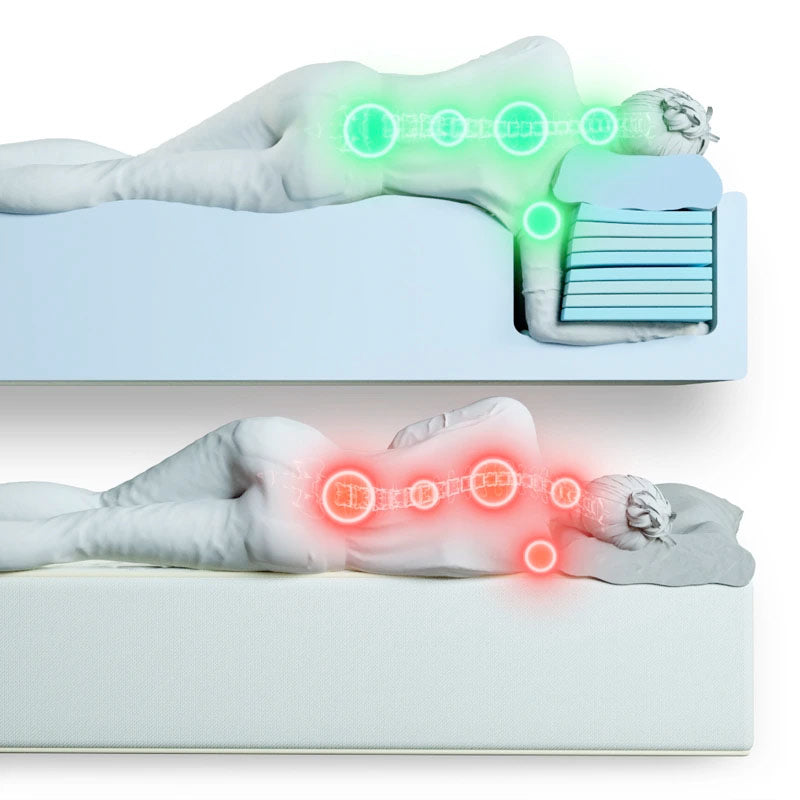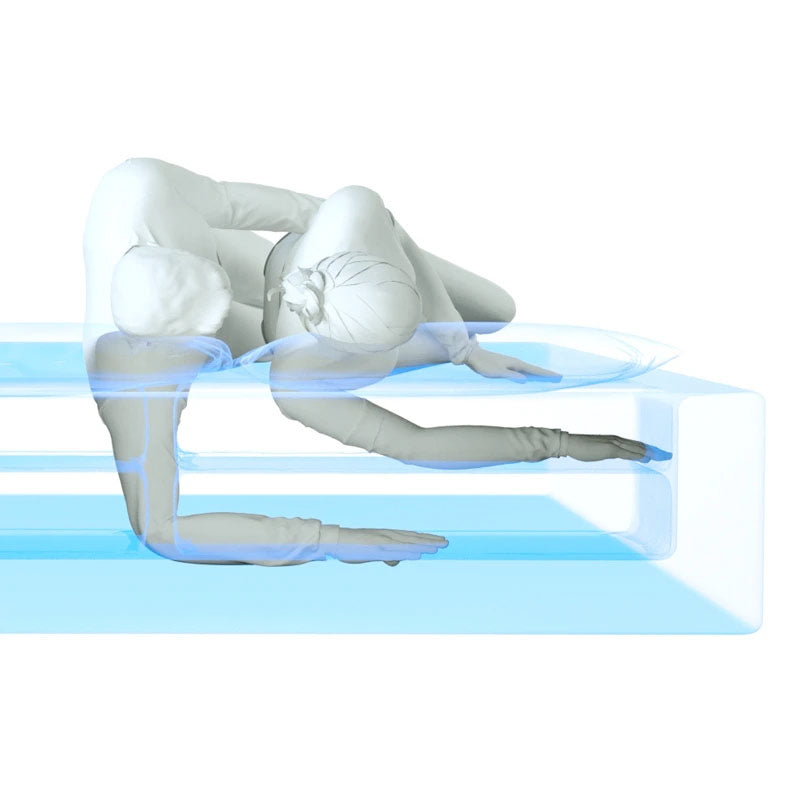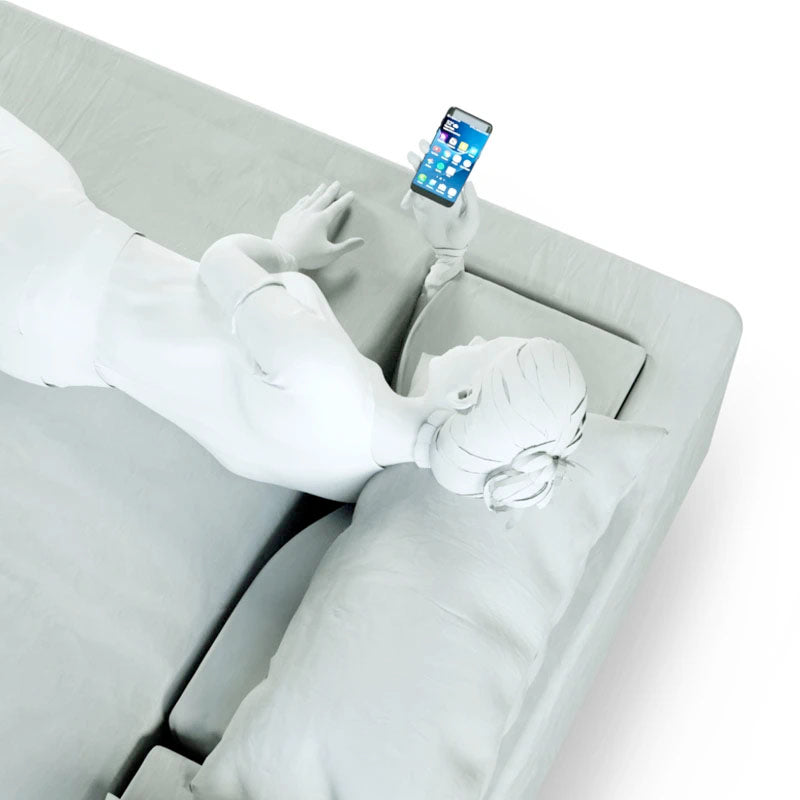It needs to be cool enough to sleep soundly when you go to bed. During sleep, your body’s temperature naturally dips by a few degrees. But if it’s too hot, you’ll find it difficult to not only fall asleep but also to stay asleep.
Since summer is in full swing, it’s a good idea to discover why you get so hot when you sleep. Once you know why you get hot, you can take steps to correct the issue and avoid night sweats in the future. Read on to learn about some common causes of sleeping hot, and how the SONU Sleep System can help.
1. It’s Too Hot in Your Bedroom
Firstly, it might just be too hot in your bedroom for comfort! Lots of sleepers forget to turn down their thermostats at night.
Alternatively, maybe you like fresh air and have your windows open, but it’s hot outside. In any case, you need to take steps to make your bedroom cool, dark, and quiet to fall asleep quickly and stay asleep until morning.
How To Fix It
Fixing your sleep environment is straightforward. Run a fan for more airflow, open your windows, or turn on your AC an hour or so before bed to get the temperature down a few degrees. You should try to get your bedroom temperature down to 65°F or even cooler if you want to enjoy deep, restful sleep more regularly.
2. Your Bedding or Pajamas Trap Heat
Next, you might get hot while you sleep because either you’re bedding materials or your pajamas trap body heat and make you warmer over time.
This is usually related to the fabric materials used for your pajamas or bedding. For example, wool pajamas can feel comfortable at first, but they aren’t ideal if you snuggle up under some covers or sheets. Wool keeps you warm: great while camping in the winter, but not comfortable when sleeping in your bedroom.
Similarly, if your bedding is made of scratchy or warm materials, you might find it tough to cool down at night, even if you open the window!
How To Fix It
Luckily, this is a very simple fix: simply pick up new pajamas or bedding materials, and you'll be good to go! Linen or fresh cotton pajamas and sheets are good choices.
3. Your Mattress Is Too Hot
Alternatively, your mattress itself might trap heat or be made with subpar materials. Certain materials, like scratchy cotton, can trap body heat and make you likely to feel excessively hot in the middle of the night.
This problem is more common with older mattresses, of course. But it can be exacerbated if you combine a bad mattress with overly thick blankets or bedding materials.
How To Fix It
Fortunately, you can fix this just as easily as you can fix the above potential cause: get a new mattress. Certain mattresses are designed with cool, eco-friendly materials that don't trap body heat but that are just as comfortable as alternative fabrics.
For example, the SONU Sleep System is made with premium, high resilience, and certified environmentally-friendly foams. This one-of-a-kind mattress even comes with custom white sheets that are designed to stay cool and comfortable all night long.
Look at alternative mattresses in your area and consider picking up a new bed if you’re regularly struggling with night sweats.
4. You’re an Athlete or Exercise Often
Athletes often have trouble with night sweats and feeling hot while they sleep. When you exercise regularly, your metabolic rate increases, and your blood vessels open up, increasing your core body temperature. That's great for burning fat and building muscle, but it also causes your body to build more muscle at night.
When this occurs, your body expends additional calories and, therefore, body heat. So you can quickly find yourself warming up under the covers as a side effect if you had an intense workout 12 hours earlier!
How To Fix It
The best way to fix exercise-related body heat is to sleep without a blanket. Try to sleep with as few pajamas as possible or a cold rag on your neck. Anything to bring your body temperature down will help you get more comfortable in minutes.
5. Your Diet Isn’t Ideal
Your diet could affect your body temperature or how many calories your body burns while you lie in bed waiting for shuteye to roll over your mind. Specifically, if you drink a lot of sugary or caffeinated beverages or eat sugary foods, your body's metabolic rate might increase, similar to when you exercise.
How To Fix It
The best way to avoid this potential issue is simply clean up your diet or, even more easily, avoid caffeine after lunch. If you're a little hungry before bed, eat a healthy snack like a few carrots or other vegetables to fill up your stomach and give your body some additional nutrients. Vegetables are ideal since they have a lot of fiber, which takes more time to burn.
6. Your Bed Is Crowded
Sleeping with a partner or pet can certainly make it too hot to sleep, especially in the warm summer months! The standard human body temperature is 98.6 degrees Fahrenheit; if you sleep with your spouse or significant other, it should be no surprise that the space under the covers is warmer than the space on top!
How To Fix It
If you still want to sleep with a partner or pet but also want to lower your skin temperature for a good night’s sleep, try sleeping in your own blanket or purchasing a larger mattress with enough space for both of you.
7. Medications and Hormone Levels Heat You Up
On top of the other potential reasons you might get hot while you sleep, any medications you take – or any hormonal imbalances you might experience – can contribute to this problem as well.
For example, various medications might cause your body temperature to increase. These include antibiotics, diabetes medication, antidepressants, and more. That’s because these medications frequently affect your body’s thermoregulation and/or metabolism.
Hormonal changes, on the other hand, can cause night sweats, higher than average body temperature, and more. Many women, for instance, experiencing menopause find that they heat up at night as part of “hot flashes.” Pregnancy, PMS, or medical conditions may further lead to higher body temperatures at night.
Medications and hormones can also affect your circadian rhythm. Fluctuations in hormone patterns can lead to overheating, excessive sweating, and issues with temperature regulation outside your normal control. Many “hot sleepers” are dealing with conditions such as hyperthyroidism, hyperhidrosis, or cancer.
How To Fix It
If you suspect your body temperature increases are due to medications, contact your doctor right away. They may be able to switch you to a different medication or recommend another measure. If it’s hormonal, you should also speak to a medical professional – again, they might be able to prescribe you the perfect remedy.
Summary
Overall, you might get hot while you sleep for any number of reasons. But identifying the root cause is the first step toward solving the issue and enjoying cool, comfortable sleep for years to come.
Remember, many people feel like it’s too hot while they sleep because their mattresses are subpar or made with less than stellar materials. If that’s the case for you, consider trying the SONU Sleep System today!
Sources:
The Best Temperature for Sleep: Advice & Tips | Sleep Foundation.
Night Sweats: Causes and Treatments | Sleep Foundation
Night Sweats: Menopause & Other Causes | Cleveland Clinic






















